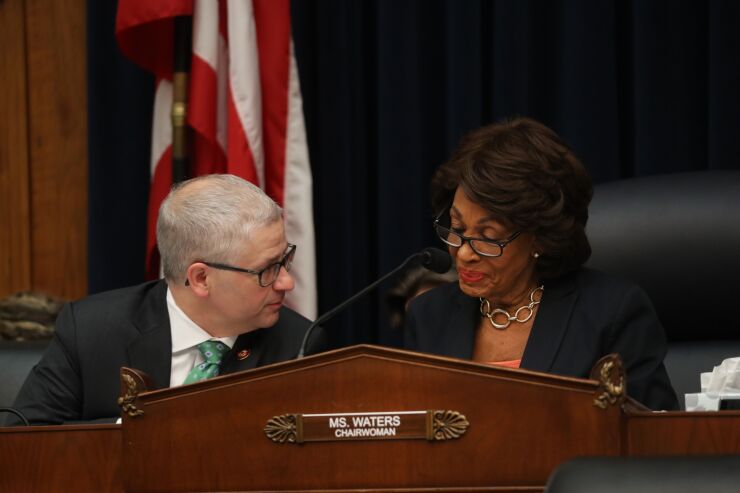WASHINGTON — Nearly finalized legislation between Democrats and Republicans on the House Financial Services Committee would authorize the Federal Reserve to license nonbank stablecoin issuers and introduce a two-year moratorium for algorithmic stablecoins.
House lawmakers have worked behind the scenes for months in an effort to create a bipartisan legislative framework for stablecoins, a type of digital asset designed to maintain consistent value in order to facilitate cryptocurrency transactions.
The latest draft is the product of weeks of back-and-forth between Democrats and Republicans. The legislative text, reviewed by American Banker on Tuesday night, was drafted by the office of House Financial Services Chair Maxine Waters, D-Calif., and reflects negotiations with ranking member Patrick McHenry, R-N.C.

It remains unclear whether McHenry will support the latest draft. Representatives for McHenry and Waters did not immediately respond to a request for comment, but McHenry told Politico that he was "cautiously optimistic" that an agreement could be reached by the end of the 117th Congress.
Under the draft legislation, a "payments stablecoin" would be defined as a digital asset "that is or is designed to be used as a means of payment or settlement" where a stablecoin issuer would be "obligated to convert, redeem, or repurchase for a fixed amount of monetary value." Stablecoins must also maintain "the reasonable expectation that it will maintain a stable value."
In a likely win for the fintech sector, non-depository institutions will have the opportunity to apply for a stablecoin license from the Federal Reserve — an application process that will be public and subject to comment. Banks, for their part, will be allowed to own stablecoin subsidiaries that would be regulated by their existing supervisors.
As
One of the draft legislation's more controversial elements for Republicans will be its harsh treatment of algorithmic stablecoins, a subgroup of digital assets that gained considerable notoriety when the crypto project TerraUSD
Under the bill, "endogenously collateralized stablecoins" would be illegal to issue in the U.S. for two years. The Treasury Department will be authorized to carry out a study of algorithmic coins, along with regulators at the Federal Deposit Insurance Corp., the Office of the Comptroller of the Currency, the Federal Reserve and Securities and Exchange Commission.

American Banker
The draft also authorizes the Fed to conduct a study on "the impact of a U.S. central bank digital currency," better known as the digital dollar. The legislation falls short of authorizing the Fed to actually create a CBDC, however. The Treasury Department last week





